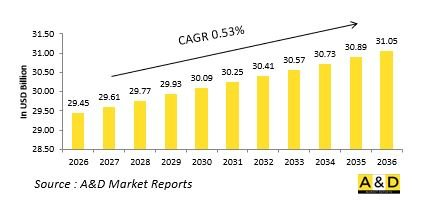
|
市場調査レポート
商品コード
1927669
爆撃機の世界市場(2026年~2036年)Global Bomber Aircraft Market 2026-2036 |
||||||
|
|||||||
| 爆撃機の世界市場(2026年~2036年) |
|
出版日: 2026年02月02日
発行: Aviation & Defense Market Reports (A&D)
ページ情報: 英文 150+ Pages
納期: 3営業日
|
概要
世界の爆撃機の市場規模は、2026年に推定294億5,000万米ドルであり、2036年までに310億5,000万米ドルに達すると予測され、2026年~2036年の予測期間にCAGRで0.53%の成長が見込まれています。

世界の爆撃機市場のイントロダクション
爆撃機は、長距離にわたって兵器を投下するために設計された戦略的・戦術的プラットフォームであり、抑止、精密攻撃、地域的飽和攻撃などの役割を果たします。現代の爆撃機は、ステルス技術、長距離推進システム、先進のアビオニクスを統合し、探知を最小化しながらの戦争中の空域への侵入を可能にします。これらの航空機は通常兵器作戦と核兵器作戦をともにサポートし、作戦上の柔軟性と戦略的抑止力を提供します。爆撃機の設計では、搭載能力、航続距離、生存性、指揮・情報システムとの統合性が重視されます。先進の目標捕捉・ナビゲーション・電子戦システムは、敵防御網への曝露を減らしつつ、精密性と作戦達成率を高めます。各国は、制空権の維持、軍事力の投射、抑止態勢の強化のために爆撃機に投資しています。ステルス機能、低可視性コーティング、レーダー回避設計は、高脅威環境下での生存性を向上させます。無人システムとの統合、ネットワーク化された作戦、多プラットフォーム連携により、作戦範囲が拡大され、作戦適応性が向上します。軍事教義は迅速な対応、戦略的柔軟性、深部攻撃能力を重視しており、爆撃機は国防戦略における不可欠なアセットとなっています。先進の推進システム、アビオニクス、ステルス技術への投資により、爆撃機は進化する作戦要件を満たし続け、現代の航空戦における戦略的関連性を維持することが保証されています。
世界の爆撃機における技術の影響
技術革新は爆撃機を変革し、ステルス性、生存性、搭載能力、作戦精度を向上させてきました。先進の推進システムは航続距離を延ばし燃料効率を改良するとともに、防衛空域への高速侵入を可能にしています。レーダー吸収材、低可視性設計、電子妨害を含むステルス技術は、現代の防空システムに対する探知可能性を低減します。統合されたアビオニクス、ナビゲーション、目標捕捉システムは、多様な作戦環境下における精密攻撃能力をもたらします。センサーフュージョン、リアルタイムインテリジェンス、データ接続性により、爆撃機は他の航空機、地上アセット、無人プラットフォームとの連携が可能となります。兵器統合システムは、多様な通常兵器と精密誘導兵器をサポートし、柔軟な作戦遂行を実現します。自動化と飛行制御技術の進歩は、安全性、作戦効率、動的脅威への対応力を向上させます。電子戦と自己防衛システムは、レーダー誘導ミサイルや対空砲に対する生存性を高めます。材料、空力特性、ネットワーク化された作戦における継続的なアップグレードにより、爆撃機隊は進化する脅威に適応できます。技術は、現代の爆撃機が深部攻撃、迅速な展開、マルチドメイン作戦への統合が可能な戦略的アセットであり続けることを保証しています。
世界の爆撃機需要の主な促進要因
爆撃機の需要は、戦略的防衛ニーズ、抑止目標、長距離攻撃能力によって促進されています。各国は、軍事力の投射、通常戦力・核戦力の作戦支援、そして制空権の維持が可能なプラットフォームを求めています。ステルス技術、アビオニクス、推進システム、兵器システムの技術的進歩により、戦争の激しい環境下での精密かつ生存性の高い作戦が可能となります。現代の軍事教義は迅速な対応、マルチドメイン統合、ネットワーク化された作戦を重視しており、戦略計画における爆撃機の重要性を高めています。地政学的緊張、領土紛争、地域紛争は、柔軟な長距離攻撃能力の必要性をさらに強めています。フリート近代化計画と防衛予算配分は、旧式爆撃機の調達、アップグレード、更新を支援します。無人システム、衛星ネットワーク、情報プラットフォームとの統合は、作戦効率と作戦効果を高めます。作戦経験は、抑止力、深部攻撃、戦力投射における爆撃機の重要性を示しています。戦略的必須要件、技術革新、進化する防衛教義により、世界中で現代的な爆撃機への継続的な投資と展開が推進されています。
当レポートでは、世界の爆撃機市場について調査分析し、市場に影響を与える技術、今後10年間の予測、各地域の動向などの情報を提供しています。
目次
爆撃機市場レポートの定義
爆撃機市場のセグメンテーション
地域別
タイプ別
エンジン別
今後10年間の爆撃機市場の分析
爆撃機市場の技術
世界の爆撃機市場の予測
地域の爆撃機市場の動向と予測
北米
促進要因、抑制要因、課題
PEST
市場予測とシナリオ分析
主要企業
サプライヤーのTierの状況
企業ベンチマーク
欧州
中東
アジア太平洋
南米
爆撃機市場の国の分析
米国
防衛プログラム
最新ニュース
特許
この市場における現在の技術成熟度
市場予測とシナリオ分析
カナダ
イタリア
フランス
ドイツ
オランダ
ベルギー
スペイン
スウェーデン
ギリシャ
オーストラリア
南アフリカ
インド
中国
ロシア
韓国
日本
マレーシア
シンガポール
ブラジル


